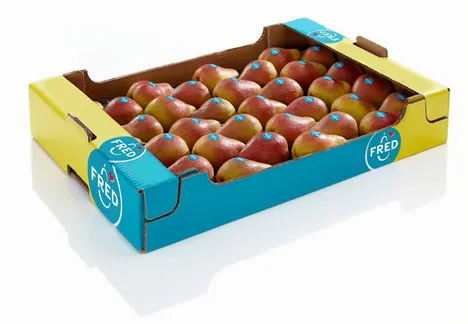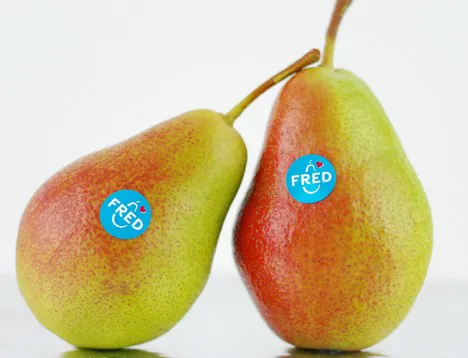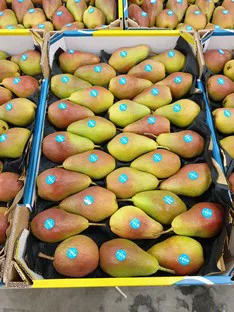The red-cheeked pear 'Fred' from Varicom has been rapidly gaining in importance since the successful brand launch in 2018. The Swiss club pear is now cultivated in all classic pear-growing regions of Western Europe - whether France, Switzerland, Italy, the Netherlands or Belgium - and the harvest volume will increase in the coming years. We spoke to Michael Weber, Managing Director of VariCom Ltd and the driving force behind the successful brand concept, about brand placement at the point of sale and the marketing potential of the pear.
As a project supervisor from the very beginning, Weber has already been intensively involved with the rollout of the club pear since 2015. Thanks to the successful work of the Swiss breeding institute Agroscope, the pear has already been placed with many food retail chains in the respective growing countries. "On today's shelves, Fred is a flagship, so to speak. That's because, compared to the apple market that is ready for innovation, club pears are few and far between anyway, and most of the commercial varieties have been available since time immemorial."
 Although the Fred is being rolled out as a uniform brand, the differences between the individual sales markets are also being taken into account. In close consultation with the respective food retail chain, the concept is adapted to individual preferences.
Although the Fred is being rolled out as a uniform brand, the differences between the individual sales markets are also being taken into account. In close consultation with the respective food retail chain, the concept is adapted to individual preferences.
According to Weber, this is also reflected in the consumer base: "Based on detailed market analyses over several years, we have found that the pear is particularly well received by the older generation. As far as the future is concerned, younger consumers have found that the pear is generally regarded as a complicated fruit, precisely because it becomes too mushy when it reaches a certain degree of ripeness. What makes the Fred stand out, however, is that even at an edible level of ripeness, it remains crisp and juicy, without losing the classic pear flavor."

The unique product features, which are appreciated by consumers, have already led to the successful launch of Clubbirne Fred. Weber says, "We're on the right track, and gratifyingly, we're doing quite well so far in attracting new and especially younger buyers to the pear."
In parallel with the planned increase in volume in the aforementioned growing countries, marketing surrounding the pear is also being further developed. "The unique color scheme represents an important recognition value with the consumer that should not be underestimated. We have also paid particular attention to this in the design of the new logo. The next step will be comprehensive tastings on site, i.e. at the POS, where we also want to actively include and communicate cultivation-specific issues, such as heat and pest problems."

Kris Jans, Manager Divisie Fruit BelOrta, talking to Fred grower Hugo Cuvelier about assessing fruit size before the start of the harvest.
Total yield to increase by 7,500 tons by 2025
As the new harvest season begins, Weber checked in with several early growers in Belgium, France and on the Po Valley about this year's crop prospects. "People are generally pleased with the uniform and evenly grown fruit, as well as the early and expected bountiful yield." Current forecasts indicate that about 200 tons will be harvested this year in Switzerland, 150 tons each in the Benelux countries and France, and about 35 tons in Italy. Weber says, "We have good hopes that by 2025 we will be able to market a total of 7,500 tons from European harvests."
begins, Weber checked in with several early growers in Belgium, France and on the Po Valley about this year's crop prospects. "People are generally pleased with the uniform and evenly grown fruit, as well as the early and expected bountiful yield." Current forecasts indicate that about 200 tons will be harvested this year in Switzerland, 150 tons each in the Benelux countries and France, and about 35 tons in Italy. Weber says, "We have good hopes that by 2025 we will be able to market a total of 7,500 tons from European harvests."
Finally, Weber also points to existing interest in other countries. "In Catalonia, the classic pome fruit growing region of Spain, as well as in Austria, there have already been small-scale trial plants for several years. The pear is also already being tested in cultivation in the southern hemisphere, such as South Africa and Chile. In these countries, we will welcome the first yields starting in 2025."
Images: © 2022 VariCom
For more information:
Michael Weber
VariCom GmbH
c/o Agroscope 
Müller-Thurgau-Str. 29
8820 Wädenswil, Schweiz
Tel + 41 (0) 58 460 61 96
Email mweber@varicom.ch
www.varicom.ch
